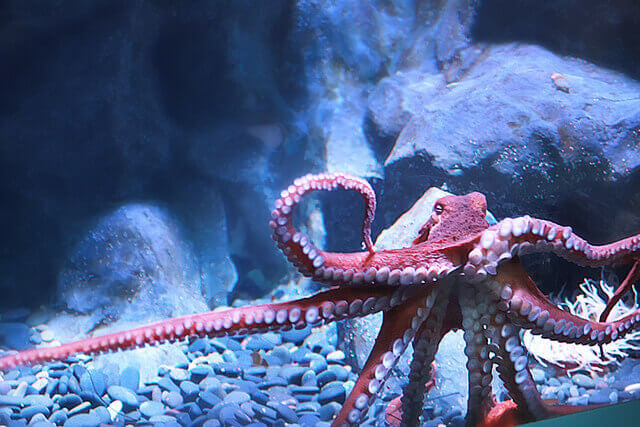
So squirting water at lights might not be something that requires much explanation. Octopuses don’t like bright lights, and they squirt jets of water at all sorts of things that annoy them (as Peter Dews discovered). However, one can also sketch an explanation which may partially deflate the story.


At the University of Otago in New Zealand, this became so expensive that the octopus had to be released back to the wild. Octopuses in at least two aquariums have learned to turn off the lights by squirting jets of water at the bulbs when no one is watching, and short- circuiting the power supply. Here is a behavior I find more intriguing. Neighboring tanks are not so different from tide pools, even though the entrance and exit take more effort. Those stories, despite their charm, are not especially indicative of high intelligence. If only, if only.The most famous octopus anecdotes are tales of escape and thievery, in which octopuses in aquariums raid neighboring tanks at night for food.

Sadly, Octopolis is the only known example. “An arm, or two, might come back in response, and this leads sometimes to a settling-down, with each octopus going on its way, but in other cases it prompts a wrestling match.” Could interactions like these lead, over many thousands of years, to the octopus becoming a brainier species? It might if there were thousands of such sites in the world’s oceans. “Some will pass by others without incident, but an octopus might also send out an arm to poke or probe at another,” Mr Godfrey-Smith writes.
#Octopus intelligence Patch
A patch of sand a few metres in diameter covered in thousands of empty scallop shells, Octopolis appears to host up to a dozen or so octopuses at any one time and presents them with an opportunity to meet. “Other Minds” presents an intriguing possibility in the form of Octopolis, off the east coast of Australia. Despite these displays of chutzpah, however, they have failed to become as smart as mammals or birds because, as a short-lived and solitary species, they have not had to contend with the many challenges of social living that seem to drive the evolution of complex brains. One researcher told him of an octopus that expressed its displeasure with the lab food by waiting until she was looking before stuffing the unwanted scrap of squid down the drain.Īccording to the author, such behaviour shows octopuses are more intelligent than the scientific literature suggests. Yet it is the anecdotes buried in research papers or related to him by scientists who work with animals that Mr Godfrey-Smith contends are often more revealing than the experiments themselves. Octopuses perform quite well in such tests but not as well as rats.

The type of consciousness experienced by an octopus, then, is wholly alien to humans.Įarly experiments assumed that the intelligence of animals could be estimated by their ability to carry out tasks, such as learning to pull a lever in exchange for food. An octopus’s body contains 500m neurons, roughly the same as a dog’s, but most of these reside in the cephalopod’s arms and allow the tentacles to act independently from the brain (their arms literally have a life of their own).


 0 kommentar(er)
0 kommentar(er)
